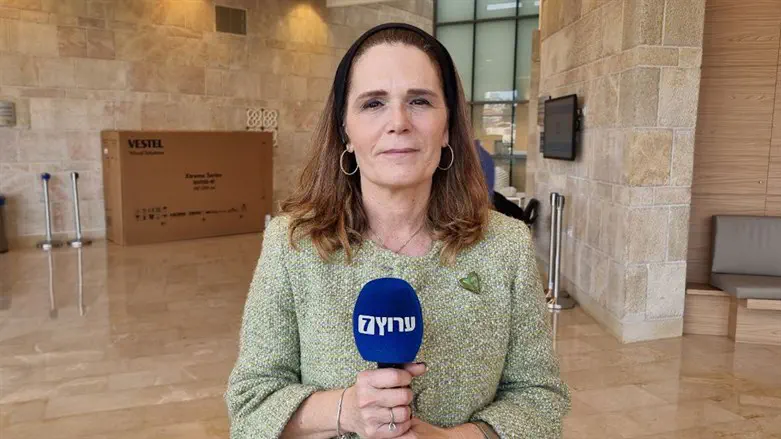
MK Michal Woldiger is working to establish a center to help soldiers returning from the battlefield and dealing with post-trauma symptoms. In an interview with Israel National News – Arutz Sheva, she talks about the importance of this initiative and also mentions what seems to be the Israeli society’s return to the legal reform controversies that "starred" before the war.
Regarding the Supreme Court's decision to abolish the limitations on the reasonableness clause, Woldiger summarizes the entire incident with one word – sad – and continues to say that she is upset about the Supreme Court’s decision to act in such a difficult way during such a difficult time, when Israel is burying its soldiers who have fallen in battle in Gaza.
Woldiger says that she went to Mount Herzl with the Lober family after they got up from shiva for their son Yehonatan, and there you can see so many new graves. At a time like this no one needs to be dealing with these kinds of disputes.
She believes that the issue should be put aside, not dealt with, and we must be focusing on victory, on the reserve duty and regular soldiers, fighting against the Hamas 'Nukhba Force,' and returning the hostages home and restoring peace. Then there will be time to deal with these issues. They are important and touch on the foundations of the Israeli society. There will be agreements to fix these, but we must be clear that this is not about smoothing over any difficulties. The difficulties exist and we will deal with it when the time is right, just as a proper society knows how to deal with problems and fixes them."
As someone who has extensive experience in mental health, MK Woldiger calls on Israeli society to be ready to face the mental consequences of the war. "The mental resilience of all Israeli citizens, and most certainly the soldiers on the front line, is critical. Not a gun, a rifle, a tank, or an armored personnel carrier will help if the soldier does not have the resilience and knowledge that he is fighting for a good and just cause. He must know that he can trust his friends and whoever sent him on this mission, that even if he is injured, someone will take care of him. Resilience is critical and we need it even in times of peace, so even more so in times of war but unfortunately we don't invest enough in it."
According to Woldiger, the lack of investment is reflected both in the individual citizens of Israel and in the state as a whole. "We don't invest enough in it and that's why I shouted about the law that was passed yesterday. It is one of the most exciting moments for me and it's just the beginning, but it's a very important law," she says and explains the nature of the law:
"According to the data I received from the beginning of the war, there are about 1,600 soldiers who have been treated for mental issues, some have returned to service, and some have not, some develop symptoms of post-trauma and this is something serious and must be given appropriate attention. Post-trauma can be a severe chronic illness, that will interfere with these people’s functioning forever and we need to do everything to prevent and treat post-trauma."
Woldiger adds: "We recently heard on the news about a soldier who heard about the attack on the morning of October 7th and responded to calls for help. He saw, heard, and had very difficult experiences. After a few weeks while he was on leave, he suffered a psychotic attack, thinking that his house was being attacked by terrorists. He ran to a neighbor and called the police to help him. In the end, he was arrested and put in prison for seven days. This is a man who fought for us on the front line and was put in prison because of trauma. His officer’s testimony didn't help either.
The law I am proposing seeks to provide a solution to these incidents. The plan is to establish a national mental health center for people to call if they need help 24/7. Our representatives will listen to the complainant or to the soldier himself, or the neighbor, and decide if a trained team should be sent out. Such a team will include a psychologist or social worker, who will handle the incident, calm the soldier down, and refer him to further treatment in the community. They will continue to accompany him until he finds a framework that will take care of him. So, instead of turning the incident into a criminal event, it will be dealt with in the community and referred to the community mental health system. Such a system exists in several countries, and we are working to implement such an option here in Israel as well."

